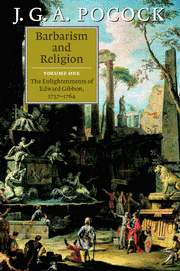Book contents
- Frontmatter
- Contents
- Acknowledgements
- Note on references, quotations and translations
- List of abbreviations
- Introduction
- PART I ENGLAND AND SWITZERLAND, 1737–1763
- PART II THE ENCOUNTER WITH PARIS AND THE DEFENCE OF ERUDITION, 1761–1763
- PART III LAUSANNE AND ROME: THE JOURNEY TOWARDS A SUBJECT, 1763–1764
- 11 The return to Lausanne and the pursuit of erudition
- 12 The journey to Rome and the transformation of intentions
- Epilogue: Gibbon and the rhythm that was different
- List of references
- Index
11 - The return to Lausanne and the pursuit of erudition
Published online by Cambridge University Press: 15 December 2009
- Frontmatter
- Contents
- Acknowledgements
- Note on references, quotations and translations
- List of abbreviations
- Introduction
- PART I ENGLAND AND SWITZERLAND, 1737–1763
- PART II THE ENCOUNTER WITH PARIS AND THE DEFENCE OF ERUDITION, 1761–1763
- PART III LAUSANNE AND ROME: THE JOURNEY TOWARDS A SUBJECT, 1763–1764
- 11 The return to Lausanne and the pursuit of erudition
- 12 The journey to Rome and the transformation of intentions
- Epilogue: Gibbon and the rhythm that was different
- List of references
- Index
Summary
Gibbon's removal from Paris to Lausanne in May 1763 occupies more than one place, and possesses more than one significance, in the frameworks of interpretation we are setting up. It does not complete the tale of his journeys through the Enlightenments, since his encounter with the Scottish variant was still to come; he had read Hume's and Robertson's histories while serving in the militia, but Adam Smith, and perhaps Adam Ferguson, had yet to assume the signal importance he came to ascribe to the former, and to Scottish philosophy in general, in the late sixties and seventies. More immediately, the departure from Paris is of some significance – it is hard to say what, since he was slow to decide himself – in establishing the distance which came to exist between Gibbon and the intellectual politics of French Enlightenment. He had hastened from England to enjoy a polite society, a crown of Enlightenment, in which letters were esteemed and institutionalised; but he had set out after declaring and inscribing his mistrust of the hegemonic tendencies he observed in Encyclopedist philosophy. It is hard to say whether this tension played a significant role in the three weeks of his first Parisian sojourn, but his movements for the rest of his life do not suggest any very strong patterns of attraction or repulsion. He left Paris to re-enter a Europe more certainly his own.
- Type
- Chapter
- Information
- Barbarism and Religion , pp. 261 - 274Publisher: Cambridge University PressPrint publication year: 1999



